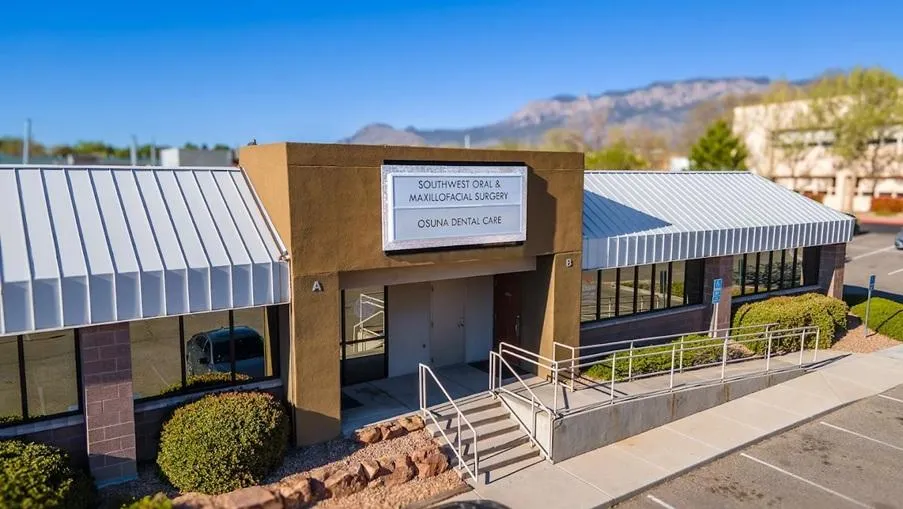




Comprehensive Family & Implant Dentistry in Albuquerque, NM
Trusted Family Dentist in Albuquerque, NM | Osuna Dental Care
For over 30 years, Osuna Dental Care has been Albuquerque's trusted choice for family, cosmetic, and implant dentistry. We're proud to be family-owned and operated since 1993, serving generations of patients — many for over 20 years.
Full-Service, Comprehensive Family and Implant Dentistry all under one roof.
🦷 All-On-4 Dental Implants starting at just $16,000 per arch — Albuquerque's most affordable price.
💬 Transparent pricing. No hidden fees. Flexible payment options available.

Osuna Dental Care
Our Dental Implant Solutions
Dental Implants in Albuquerque, NM 87109
Replace missing teeth with durable, natural-looking dental implants. We offer single implants, All-on-4 full-arch restorations, and implant-retained dentures — all at Albuquerque’s most transparent prices.
All-on-4 Dental Implants – Starting at $16,000 per arch
Implant-Retained Dentures – Secure, comfortable, and affordable
Full-Mouth Implant Restorations – Long-lasting tooth replacement
Same Day Implants options - Enjoy teeth in a day!
Transparent pricing and Payment plans available
Complimentary exam, consult, and 3D X-rays included for new patients
✨ Experience complete dental care under one roof — backed by advanced technology, proven expertise, and a team that truly cares.
🏆 Consistently ranked among the best dentists in Albuquerque by our peers and patients. Discover why the majority of our patients have trusted us for over 30 years. 1500+ 5-Star Reviews and counting
Why Patients Choose Us
Why Choose Osuna Dental Care?
Experience the difference of personalized, compassionate dental care backed by three decades of excellence
30+ Years of Excellence
4.9★ Rated, Trusted by Families for Over 30 Years
Family-Owned & Operated
Experienced Team of Dentists & Implant Specialists
Transparent Pricing
Transparent Pricing and Flexible Financing (Cherry, CareCredit, Sunbit)
Advanced Technology
Advanced Technology & Same-Day Emergency Dental Services
Convenient Location
Convenient Location at 5900 Cubero Dr NE STE B, Albuquerque, NM 87109
full-service Dentistry
Routine cleaning & exam to advanced dental implant procedures. All in one location
SERVICES
Comprehensive Dental Services in Albuquerque, NM
At Osuna Dental Care, we provide a full range of dental services to meet all your family's needs under one roof.

Save infected or damaged teeth with gentle, painless root canal treatment. Our dentists use advanced technology for quick relief and lasting results.

Restore missing teeth with durable, natural-looking implants that preserve bone health and function like real teeth.

Straighten your smile discreetly with custom clear aligners — no wires, no diet restrictions, and fewer office visits.

Protect or replace damaged and missing teeth with durable crowns and bridges. Ask about our CEREC / Glidewell same-day crowns for convenience.

Keep your smile healthy with routine cleanings or treat gum disease with deep cleaning (scaling & root planing).

Same-day emergency appointments for tooth pain, broken teeth, infections, or knocked-out teeth. Call Now: (505) 884-1989

About
Meet Your Albuquerque Dentists - Family Dental Care Since 1993
At Osuna Dental Care, we're more than just your dentists—we're your neighbors and your partners in achieving optimal oral health. Our family-owned practice has deep roots in the Albuquerque community, and we take pride in building lasting relationships that span generations.
Our Story
For over 30 years, Osuna Dental Care has been the trusted choice for families throughout Albuquerque, Rio Rancho, North Valley, Uptown, to the Northeast Heights. What started as a small practice with a big vision has grown into one of Albuquerque's most respected family dental offices—but we've never lost sight of what matters most: treating every patient like family.
Our Philosophy
We believe quality dental care begins with trust, communication, and genuine compassion. That's why we take time to get to know you before recommending any treatment. We listen to your concerns, explain all options clearly, and never pressure you into unnecessary procedures.


Frequently Asked Questions
How much does a dental visit cost in Albuquerque?
At Osuna Dental Care, routine dental exam and cleaning costs range from $150-$300 without insurance. With dental insurance, most preventive visits are covered 100%. We offer transparent pricing and will provide a detailed cost estimate before any treatment.
Do you accept my dental insurance?
We accept most dental insurances including: Delta Dental, Aetna, Metlife, Cigna, Ameritas, Guardian, Humana, Blue Cross Blue Shield, United Health Care, United Concordia, and Medicare dental plan. Call our Albuquerque office at (505) 884-1989 to see if we accept your dental insurance.
What payment plans do you offer?
We accept cash, credit, and checks, and offer flexible financing options through Cherry, CareCredit, and Sunbit.
Are you accepting new patients?
Yes! We're always welcoming new patients and families to Osuna Dental Care. Schedule your new patient appointment today by calling (505) 884-1989 or booking online.
Do you offer emergency dental care?
Yes! We provide same-day emergency dental appointments in Albuquerque for tooth pain, cracked teeth, or dental trauma.
How do I schedule an emergency dental appointment?
Call us immediately at (505) 884-1989. We reserve time slots daily for dental emergencies and will get you in as quickly as possible, often the same day.
What should I bring to my first appointment?
Please bring your insurance card, photo ID, list of current medications, and completed new patient forms (available on our website). Arrive 10-15 minutes early.
What are All-on-4 Dental Implants?
All-on-4 implants replace a full arch of missing teeth using just four implants for support. They’re strong, natural-looking, and start at just $15,999 per arch at our Albuquerque office. Our team of trained implant specialists plans every case with 3D imaging and precision placement to ensure long-term stability, comfort, and a natural smile — often with same-day teeth available. We are proud to offer affordable All-On-Four Implant dentures to our Albuquerque community using high-end technology and products.
Are Dental Implants covered by my Insurance?
Under certain plans, dental insurance companies in Albuquerque, NM — including Delta Dental of New Mexico — may cover portions of dental implant treatment. Coverage varies by plan, so our team will verify your benefits, provide a detailed estimate, and help you maximize your insurance reimbursement. Call our office at (505) 884-1989 for a complimentary dental implant consultation to see if your insurance covers your treatment!
What are Implant-Retained Dentures?
Or Snap-In Dentures. These dentures "Snap-In" into the dental implants, offering improved comfort and stability compared to traditional dentures.
Is teeth whitening safe?
Yes, professional teeth whitening performed by our dentists is completely safe. We use ADA-approved products and custom trays for even, effective results without damaging enamel.
How can I prevent cavities?
Brush twice daily with fluoride toothpaste, floss daily, limit sugary foods and drinks, visit your dentist every six months, and consider dental sealants for extra protection.
What age should children start seeing the dentist?
Children should have their first dental visit by age one or within six months of their first tooth appearing, whichever comes first.
Do you provide teeth straightening for adults?
Yes! We offer clear aligners (Invisalign) perfect for adults who want discreet orthodontic treatment without metal braces. Most treatment completes in 12-18 months.
What's the difference between a dentist and an endodontist?
A dentist provides general dental care. An endodontist is a specialist focused on root canal therapy and treating dental pulp issues. Our dentists are highly experienced in endodontic procedures.
How long does a root canal take?
Most root canal procedures take 60-90 minutes for a single visit. At Osuna Dental Care, we use 3D X-ray imaging to efficiently and skillfully complete your root canal. If indicated, our dentist will prepare the tooth for a dental crown the same day. Please ask about our Same-day Root Canal and Crown. No need for a second visit!
Emergency Dental Services in Albuquerque, NM
If you’re searching for an “emergency dentist near me”, we offer same-day appointments for pain relief, broken teeth, or lost crowns.
Call (505) 884-1989
Flexible Payment Options
We believe everyone deserves a confident, healthy smile.
Cash, Credit, or Check accepted
Payment Plans / Financing available through Cherry, CareCredit, Sunbit
Works with most dental insurances, including: Delta Dental, Aetna, Metlife, Cigna, Ameritas, Guardian, Humana, Blue Cross Blue Shield, United Health Care, United Concordia, and Medicare dental plans.
LOCATION
Visit Osuna Dental Care in Albuquerque, NM
Office Location: 5900 Cubero Dr NE STE B, Albuquerque, NM 87109
Serving: Albuquerque, Rio Rancho, North Valley, Los Ranchos De Albuquerque, Northeast Heights, Uptown, and surrounding New Mexico communities
Osuna Dental Care | Dentist in Albuquerque, NM
Comprehensive Family, Cosmetic, and Implant Dentistry
5900 Cubero Dr NE STE B, Albuquerque, NM 87109
(505) 884-1989
Convenient Location Near:
Albuquerque Academy
Paseo del Norte & I-25 intersection
Jefferson Middle School
Academy and Wyoming
Easy access from Northeast Heights
Parking: Free, ample parking available directly in front of our office
Phone: (505) 884-1989
Office Hours:
Monday: 7:00 AM - 4:00 PM
Tuesday: 7:00 AM – 4:00 PM
Wednesday: 7:00 AM – 5:00 PM
Thursday: 8:00 AM – 5:00 PM
Friday: 7:00 AM – 4:00 PM
Saturday, Sunday: Closed
